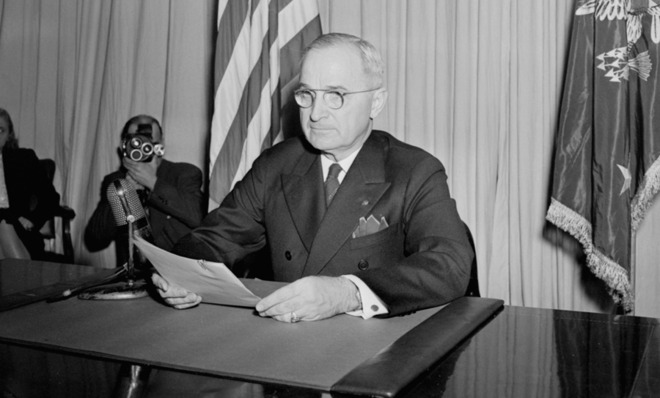Today in history: The beginning of the Korean War
After the North invaded the South, President Truman acted quickly

A free daily email with the biggest news stories of the day – and the best features from TheWeek.com
You are now subscribed
Your newsletter sign-up was successful

June 24
On this day in 1853: President Franklin Pierce signed the Gadsden Purchase — a treaty with Mexico that gave the United States what is today 29,000 square miles of Arizona and New Mexico.
On this day in 1908: Grover Cleveland died. He was the 22nd and 24th president, serving between 1885-89 and 1893-97. Cleveland lost his re-election bid in 1888 to Benjamin Harrison, even though he won the popular vote (which also happened in 1824, 1876, and 2000). If he had won his home state (New York), he'd have been re-elected. But Cleveland got his revenge on Harrison in 1892.
The Week
Escape your echo chamber. Get the facts behind the news, plus analysis from multiple perspectives.

Sign up for The Week's Free Newsletters
From our morning news briefing to a weekly Good News Newsletter, get the best of The Week delivered directly to your inbox.
From our morning news briefing to a weekly Good News Newsletter, get the best of The Week delivered directly to your inbox.
Cleveland was the only president who got married in the White House. Frances Folsom snagged him in 1886. He was 49. She was 21.
Cleveland was the only Democrat elected to the presidency between 1860 and 1912, an era thoroughly dominated by Republicans. He was a pro-business, free-market president who hated subsidies and tariffs. He was an icon of American conservatives.
A Cleveland biographer noted that "he possessed honesty, courage, firmness, independence, and common sense... to a degree other men do not," though that didn't stop the president from being snared in a political scandal of his own making: he fathered a child out of wedlock — but survived the ensuing uproar.
Cleveland's opponents joked about his out-of-wedlock child: "Ma, Ma, where's my Pa?" Cleveland's supporters: "Gone to the White House, ha, ha, ha!"
A free daily email with the biggest news stories of the day – and the best features from TheWeek.com
On this day in 1929: President Herbert Hoover proclaimed the Kellogg-Briand Pact, which renounced war, would be the a key instrument of U.S. foreign policy. It didn't work too well.
On this day in 1948: On President Harry Truman's orders, U.S. and British forces began the Berlin Airlift to supply their garrisons and the population of Berlin. The airlift became necessary after Soviet troops began a blockade of West Berlin, cutting off all road and rail access between the city and western Europe. It was a contest of wills between Truman and Soviet Premier Josef Stalin, and Truman was determined to win. Allied aircraft flew relief missions around the clock, delivering as many as 5,000 tons of supplies daily. Planes arrived every 30 seconds at multiple airports. Stalin lifted the blockade on May 12, 1949.
On this day in 1950: President Harry Truman was informed by Sec. State Acheson that North Korea had invaded South Korea (it was June 25 in Korea itself). Two days after the North Korean attack, Truman ordered U.S. forces to respond. America, he said, would contain communism.
Quote of the Day
"Above all, tell the truth." —Grover Cleveland
More from West Wing Reports...
-
 How the FCC’s ‘equal time’ rule works
How the FCC’s ‘equal time’ rule worksIn the Spotlight The law is at the heart of the Colbert-CBS conflict
-
 What is the endgame in the DHS shutdown?
What is the endgame in the DHS shutdown?Today’s Big Question Democrats want to rein in ICE’s immigration crackdown
-
 ‘Poor time management isn’t just an inconvenience’
‘Poor time management isn’t just an inconvenience’Instant Opinion Opinion, comment and editorials of the day